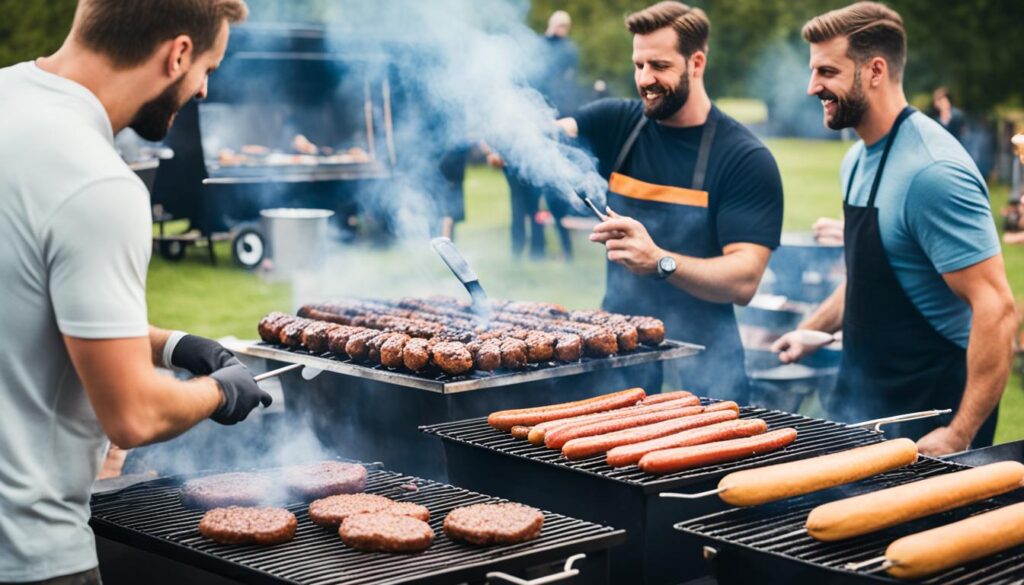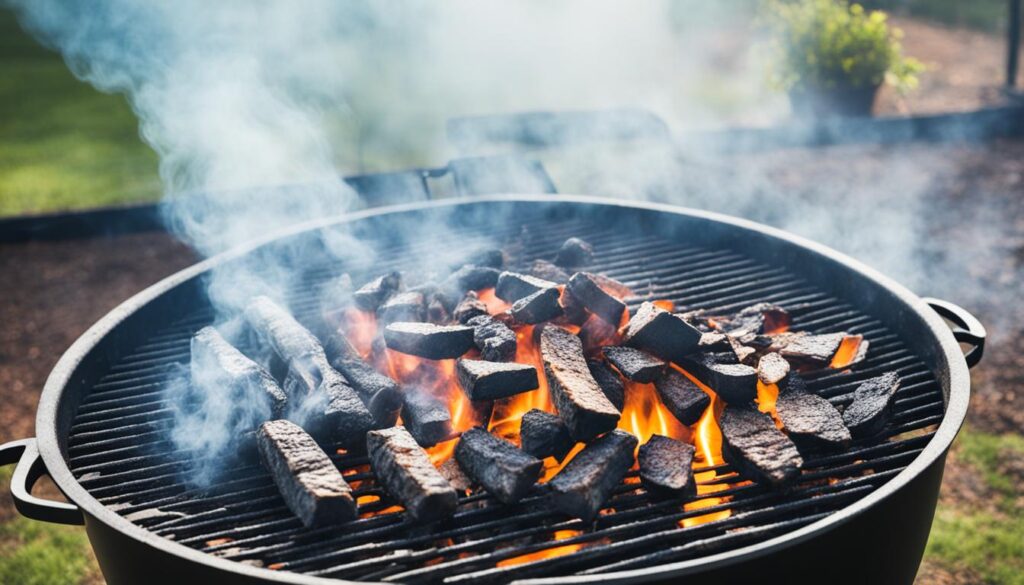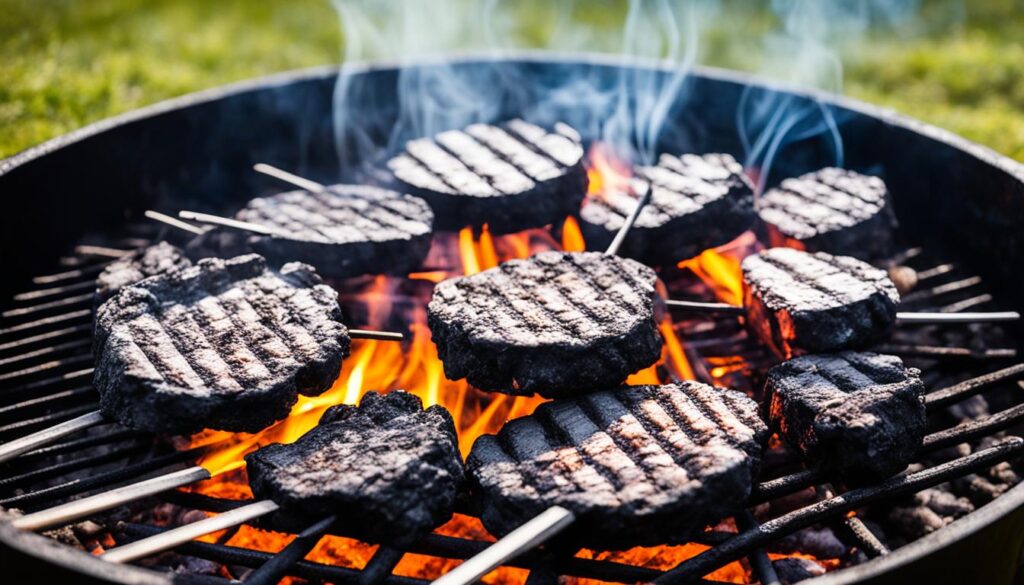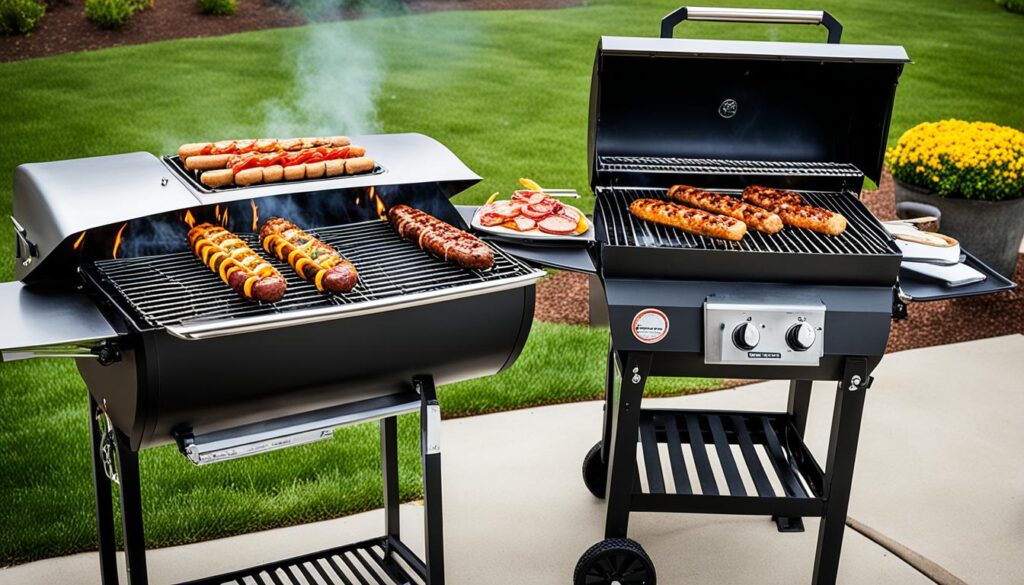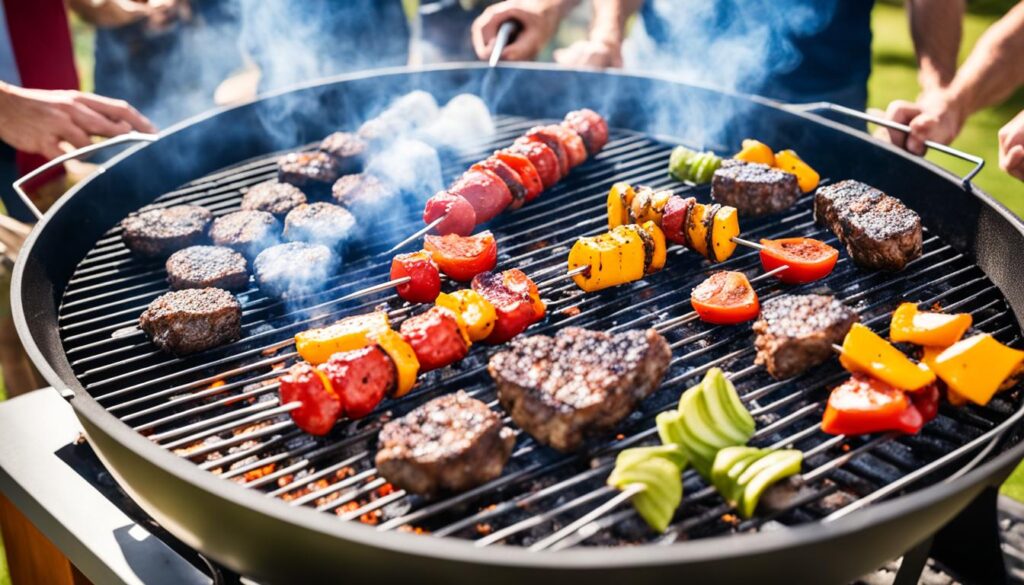The debate between gas and charcoal grilling has been ongoing for years. People have strong opinions on the matter, but let’s take a closer look at the pros and cons of each option. From flavor differences to ease of use, we’ll provide all the information you need to make an informed decision on which type of BBQ grill is best for you.
Key Takeaways:
- Gas BBQs offer convenience and quick start-up times, making them ideal for midweek cooking and larger gatherings.
- Charcoal BBQs provide versatility, allowing for high or low-temperature grilling, along with the opportunity for smoky flavors.
- Consider factors such as build time, storage options, and the specific features of each type when choosing the right BBQ grill.
- Both gas and charcoal grilling contribute to the flavor of the food, and personal preference plays a significant role in determining which flavor you prefer.
- Gas grills are generally easier to use, while charcoal grills offer greater control over heat and cooking techniques.
Gas BBQ Advantages
When it comes to barbecue grills, gas BBQs offer a range of advantages that make them a popular choice for many outdoor cooking enthusiasts. Let’s take a closer look at the pros and cons of gas grills as we compare them to other types of BBQs.
One of the key advantages of gas BBQs is the convenience they provide. With a gas grill, you don’t need to worry about the hassle of lighting charcoal or waiting for it to heat up. Simply turn on the gas, and you’re ready to start cooking in under 10 minutes. This is especially beneficial for those midweek dinners when time is of the essence.
Another advantage of gas grills is their efficiency and precise temperature control. Gas BBQs allow you to easily adjust the heat level, ensuring that your food is cooked to perfection. Whether you’re searing steaks or grilling delicate vegetables, having precise control over the temperature provides better overall cooking results.
Gas grills also offer direct and consistent heat distribution, making it easier to achieve that desirable sear on meats and other grilled staples. The even heat distribution ensures that your food cooks evenly, resulting in delicious and evenly cooked meals.
Gas BBQs are also ideal for larger gatherings, as they provide ample cooking space and power. Whether you’re hosting a backyard barbecue or a family get-together, a gas grill can handle the demands of cooking for a crowd.
However, it’s essential to mention a few considerations when it comes to gas grills. While they excel in convenience, efficiency, and even heat distribution, they may struggle with heat retention, especially when it comes to larger cuts of meat. Building flavorful crusts on larger cuts can be more challenging on gas grills compared to other types of BBQs.
Furthermore, gas grills may not be the best option for those who enjoy indirect cooking or smoking. Achieving low and slow cooking on a gas grill requires additional accessories and can be more complicated compared to charcoal grills or smokers.
Overall, gas BBQs offer numerous advantages in terms of convenience, efficiency, and quick start-up times. They provide precise temperature control and even heat distribution, making it easier to achieve excellent results. However, it’s important to consider their limitations when it comes to heat retention and certain cooking techniques. Let’s move on to the next section to explore the benefits of charcoal BBQs.
Charcoal BBQ Benefits
When it comes to BBQ grilling, charcoal BBQs offer a range of benefits that set them apart from their gas counterparts. Let’s explore some of the advantages of using a charcoal grill and how they differ from gas grills.
Consistent Radiant Heat
One of the key benefits of a charcoal BBQ is the consistent radiant heat that it provides. The charcoal briquettes distribute heat evenly, allowing for precise cooking temperatures. This makes it easier to sear meats quickly or slow-cook large cuts to perfection.
Versatile Cooking Options
Charcoal grills also offer versatility when it comes to cooking options. You can easily adjust the temperature by adding or removing charcoal, allowing for high or low-temperature grilling. This flexibility enables you to experiment with different cooking techniques and achieve a variety of flavors.
Indirect Grilling and Smoking
Another advantage of charcoal BBQs is their ability to facilitate indirect grilling and smoking. By arranging the charcoal on one side of the grill and placing the food on the other, you can create a cooking environment similar to an oven. This technique is ideal for slow-cooking larger cuts of meat or creating a smoky flavor by using wood smoke chips or chunks.
| Charcoal BBQ Benefits | Gas BBQ Benefits |
|---|---|
| Consistent radiant heat | Convenience and quick start-up times |
| Versatile cooking options | Precise temperature control |
| Indirect grilling and smoking | Direct and consistent heat |
It’s important to note that while the charcoal itself doesn’t add much smokiness, the flavor comes from the drippings hitting the hot coals and creating smoke. This unique cooking method adds a distinct flavor profile to your grilled food.
However, it’s worth considering that heat control can be more challenging with live fire. You’ll need to adjust the amount of charcoal and monitor the temperature throughout the cooking process. Additionally, charcoal grills may require more time and effort to set up and clean compared to gas grills.
With the benefits of consistent radiant heat, versatile cooking options, and the ability to achieve indirect grilling and smoking, a charcoal BBQ is a great choice for those looking to take their grilling skills to the next level.
Choosing the Right BBQ Grill
When it comes to choosing the right BBQ grill, there are several factors to consider. Whether you’re a fan of the convenience and quick start-up times of gas grills or the smoky flavors produced by charcoal grills, it’s important to find a grill that suits your needs and preferences.
For gas grills, take into account the size of the cooking area and whether it provides enough space for your grilling needs. Additional shelves for cooling can also be beneficial, especially if you plan on hosting larger gatherings. Efficiency of heat distribution is another key consideration to ensure even cooking. Each gas grill model offers its own features and benefits, so choose one that aligns with your cooking style.
On the other hand, if you’re considering a charcoal grill, think about the capacity it offers and whether it can accommodate your desired quantity of food. Storage options are also important to consider, especially if you have limited space. Pay attention to the build time of the grill and the quality of materials used. Charcoal grills come in various sizes, ranging from small portable options for picnics to larger grills with more cooking space for backyard gatherings.
To make an informed decision, compare the pros and cons of gas and charcoal grills. Think about factors such as build time, storage options, versatility, and sturdiness. Consider your grilling needs, personal preferences, and the specific features of each grill type. This will help you choose the BBQ grill that best suits your requirements and enhances your grilling experience.
| Gas Grills | Charcoal Grills | |
|---|---|---|
| Convenience | Quick start-up times, easy to use | More time and effort to set up |
| Temperature Control | Precise control of temperature | Heat control can be more challenging |
| Versatility | Variety of features for different cooking styles | Allows for different cooking techniques |
| Flavor | May lack the traditional smoky flavor | Enhanced smoky flavors |
| Build Time | Ready to use in a matter of minutes | May take longer to set up |
| Storage Options | Consider space for additional shelves | Look for storage options to suit your needs |
| Quality | Choose a grill made of durable materials | Consider the quality of materials used |
Gas vs. Charcoal BBQ Flavor
The flavor difference between gas and charcoal grills is a subject of debate. Some argue that charcoal imparts a unique taste to grilled food due to the drippings hitting the hot coals and creating smoke. Others believe that the flavor comes from the drippings regardless of the fuel source. The radiant heat in both gas and charcoal grilling contributes to the flavor of the food. Ultimately, personal preference will play a significant role in determining which flavor you prefer.
In my experience, the flavor of food cooked on charcoal grills does have a distinct smokiness. The drippings sizzling on the hot coals create a rich, aromatic smoke that adds depth to the flavor profile. Whether it’s a juicy steak, succulent ribs, or smoky vegetables, the charcoal imparts a unique taste that many BBQ enthusiasts enjoy.
However, it’s important to note that gas grills also produce excellent flavor. The radiant heat from the gas burners creates a Maillard reaction, resulting in caramelization and the development of complex flavors on the surface of the food. Gas grills provide consistent heat, helping to achieve a delicious, evenly cooked meal.
Personal preference is key when it comes to the flavor of BBQ. Some people crave the unmistakable smokiness of food cooked on charcoal, while others appreciate the clean and consistent flavor that gas grills offer. Ultimately, the choice between gas and charcoal BBQ flavor boils down to individual taste and the specific dishes you enjoy grilling.
Gas BBQ Advantages:
- Convenient and quick start-up times
- Precise temperature control for better overall cooking control
- Direct and consistent heat for easy searing of meats and other grilled staples
Charcoal BBQ Benefits:
- Versatility in cooking techniques, including high or low-temperature grilling
- Consistent radiant heat ideal for quick searing or slow-cooking large cuts
- Facilitates indirect grilling and smoking for enhanced flavor
To further illustrate the flavor differences between gas and charcoal grilling, here is a comparison table:
| Gas Grills | Charcoal Grills | |
|---|---|---|
| Flavor | Slight smokiness from drippings, radiant heat caramelization | Distinct smoky flavor from charcoal and drippings hitting hot coals |
| Temperature Control | Precise temperature control | Variable heat control; indirect grilling and smoking techniques |
| Convenience | Quick start-up times; easy to use | Requires more time and effort to set up |
| Versatility | Excellent for midweek cooking and larger gatherings | Allows for various cooking techniques and smoke flavor |
As you can see, both gas and charcoal grills offer unique advantages, and the choice ultimately depends on your personal preferences and grilling style. Whether you prefer the smoky flavor of charcoal or the convenience and precision of gas, both options can deliver delicious results.


Gas BBQ vs. Charcoal BBQ Ease of Use
When it comes to ease of use, both gas and charcoal BBQs have their own advantages. Let’s compare the two and see which one suits you best.
Ease of Use: Gas BBQs
Gas BBQs are known for their convenience and user-friendly features. They offer quick start-up times and precise temperature control, making it easy to get grilling in no time. Whether you’re grilling burgers, veggies, or steaks, a gas BBQ allows you to adjust the heat with a simple turn of a knob, ensuring consistent cooking results. It’s perfect for midweek cooking when time is of the essence.
Gas grills are also known for their simplicity in preparation. With no need to deal with charcoal or lighter fluid, all you have to do is connect the gas cylinder, turn on the gas, and ignite the burners. This ease of use makes gas BBQs an excellent choice for beginners or those seeking a hassle-free grilling experience.
Moreover, gas grills provide greater convenience in terms of temperature control. With precise heat settings, it’s easier to achieve the desired cooking temperature for different recipes. You can easily switch between direct heat for searing and indirect heat for slow cooking. This versatility allows for a wide range of grilling techniques and gives you more control over your cooking.
Ease of Use: Charcoal BBQs
While gas BBQs offer convenience, charcoal BBQs excel in providing a more traditional grilling experience and unmatched flavor. However, they require a bit more effort and time to set up.
When using a charcoal BBQ, you need to light the charcoal using a chimney starter or charcoal starter fluid, and wait for it to ash over before you can start grilling. This process may take around 15-20 minutes, depending on the type and quality of charcoal. Once the charcoal is ready, you can spread it evenly in the grill and adjust the airflow to control the heat.
The extra effort required to set up a charcoal BBQ pays off in terms of versatility. Charcoal grills allow for different cooking techniques, including direct grilling, indirect grilling, and smoking. The radiant heat from the coals provides a unique, smoky flavor to your food that can’t be replicated with a gas grill. The flavor profile of charcoal grilling is often preferred by enthusiasts who enjoy that distinctive smoky taste.
While it may take more dedication and patience to use a charcoal BBQ, the control over heat and cooking techniques offers a rewarding grilling experience for those who enjoy the process and appreciate the authentic flavors.
So, which type of BBQ is easier to use? It depends on your preferences and priorities. If you value convenience, quick start-up times, and precise temperature control, a gas BBQ is the way to go. On the other hand, if you appreciate the traditional grilling experience and enjoy experimenting with different techniques and flavors, a charcoal BBQ offers versatility and that signature smoky taste.
Next, let’s explore the cleaning process for gas and charcoal grills to complete your understanding of these two popular options.
Gas vs. Charcoal BBQ Cleaning
Cleaning your BBQ grill is an essential part of maintaining its performance and prolonging its lifespan. When it comes to cleaning, there are differences between gas and charcoal grills that you should consider. Let’s take a closer look at the cleaning process for each type.
Gas Grill Cleaning
Cleaning a gas grill is typically easier compared to cleaning a charcoal grill. Gas grills often have removable grates, which can be easily cleaned with a brush and warm soapy water. You can also clean the exterior of the grill using mild dish soap and a sponge. However, make sure to check the manufacturer’s instructions for any specific cleaning recommendations.
| Gas Grill Cleaning | Advantages |
|---|---|
| Removable grates | Easy to clean |
| Mild dish soap and sponge | Simple exterior cleaning |
| Manufacturer’s instructions | Specific cleaning recommendations |
Gas grills may have fiddly knobs and other separate parts that require cleaning. It’s important to regularly inspect and clean these parts to ensure they are functioning properly. Overall, the cleaning process for gas grills is relatively straightforward and can be done in a timely manner.
Charcoal Grill Cleaning
Cleaning a charcoal grill requires additional steps compared to a gas grill. After each use, you’ll need to remove the ashes from the grill’s ash catcher or bottom tray. An ash vacuum or a specifically designed ash removal tool can simplify this task. You should also clean the grates using a brush and warm soapy water, similar to gas grills.
Additionally, charcoal grills may accumulate residue from previous cooking sessions, such as grease and drippings. You’ll need to deep clean the interior and exterior surfaces of the grill periodically. This can be done with a grill cleaner and a scrub brush. Again, refer to the manufacturer’s instructions for any specific cleaning recommendations.
| Charcoal Grill Cleaning | Advantages |
|---|---|
| Ash removal | Clears out residue |
| Grate cleaning | Similar to gas grills |
| Interior and exterior surfaces | Deep cleaning required |
Cleaning a charcoal grill can be more time-consuming due to the additional steps involved, such as ash removal and deep cleaning of surfaces. However, by regularly maintaining and cleaning your charcoal grill, you can ensure its optimal performance and extend its lifespan.
Gas vs. Charcoal BBQ Cost
When it comes to the cost of BBQ grills, there are some notable differences between gas and charcoal options. Gas grills tend to have a higher upfront cost compared to charcoal grills. This is due to their larger cooking areas and the added features they often come with. Gas BBQs offer convenience, precision temperature control, and other benefits that make them a popular choice for many grill enthusiasts.
Charcoal grills, on the other hand, generally have a simpler design and are more affordable initially. They provide a more traditional grilling experience and are favored by those who enjoy the process of starting a fire and tending to the charcoal. However, it’s worth considering the ongoing cost of fuel. Charcoal is widely available and tends to be more affordable, making it a cost-effective choice in the long run.
When deciding between gas and charcoal grills, it’s important to consider your budget and the long-term costs associated with each option. Gas grills may require a larger upfront investment, but they offer convenience and a range of features. On the other hand, charcoal grills are more affordable initially but may require more frequent fuel purchases. Take these factors into account when making your decision.
Is Charcoal Necessary for Flavorful BBQ?
The belief that charcoal is necessary for flavorful BBQ is a matter of debate. Carbon, whether from charcoal or gas, doesn’t impart flavor to the food being grilled. The flavor comes from the drippings hitting the heat source and creating smoke. Gas grills use surfaces like lava rocks or ceramic plates to create radiant heat, similar to the heat produced by charcoal. While many enjoy the taste of food cooked on charcoal, it is not the only way to achieve flavorful results.


Charcoal grills are often associated with a distinct smoky flavor that many BBQ enthusiasts enjoy. However, it is important to note that the flavor in BBQ comes from the smoke created when the drippings from the food hit the hot surface of the grill. This happens regardless of whether you are using charcoal or gas. Gas grills use lava rocks, ceramic plates, or metal flavorizer bars to produce radiant heat, which creates a similar smoky flavor.
While the flavor may be slightly different between gas and charcoal grilling, it ultimately comes down to personal preference. Some people prefer the taste that charcoal imparts, while others enjoy the convenience and ease of use that gas grills offer. It’s important to consider your own taste preferences and the specific features of each type of grill when deciding which one is right for you.
Saving Time with Gas Grills
When it comes to grilling, time is often of the essence. That’s where gas grills shine, offering a time-saving advantage that can’t be ignored. The ease and efficiency of gas grills make them the perfect choice for those who want to get their grilling done quickly and effortlessly.
With just a simple push of a button, gas grills can be started up in a matter of seconds. Unlike their charcoal counterparts, there’s no need to wait for charcoal to ignite and reach optimal cooking temperature. Gas grills heat up rapidly, allowing you to start cooking within minutes.
Whether you’re looking to whip up a quick weeknight meal or host a gathering with friends and family, a gas grill provides the convenience and speed you need. It eliminates the hassle and waiting time associated with charcoal grills, allowing you to focus on enjoying delicious food and great company.
Take a look at the comparison table below to see just how gas grills save time compared to charcoal grills:
| Gas Grills | Charcoal Grills | |
|---|---|---|
| Start-up Time | Seconds to minutes | 10-20+ minutes |
| Cooking Time | Rapid cooking | Varies based on charcoal readiness |
| Clean-up Time | Quick and easy | Ash removal and cleaning required |
As you can see, gas grills offer significant time-saving advantages that can make a real difference in your grilling experience. Whether you’re a busy professional or simply value efficiency in your cooking, a gas grill is the way to go.
Personal Preference in the Gas vs. Charcoal Debate
When it comes to the gas vs. charcoal BBQ debate, the final decision ultimately comes down to personal preference. Both gas and charcoal grills have their own advantages and benefits, making them suitable for different types of grillers. It’s important to consider your cooking style, preferences, and the specific features of each type when deciding which grill is best for you.
Gas grills offer convenience and ease of use, making them a popular choice for those who want a simple grilling experience. With quick start-up times and precise temperature control, gas grills allow you to begin cooking in no time. They are also great for midweek cooking and larger gatherings due to their direct and consistent heat, making it easy to sear meats and other grilled favorites. However, gas grills may struggle with heat retention and building flavorful crusts on larger cuts.
On the other hand, charcoal grills provide versatility and the opportunity to create a distinct smoky flavor. They offer consistent radiant heat, making it easier to sear meats quickly or slow-cook large cuts. Charcoal grills also allow for indirect grilling and smoking, enhancing the flavor of your food with the use of wood smoke. While they may require more time and effort to set up and clean, the flavor and cooking experience they provide is unmatched by gas grills.
Remember, there is no right or wrong choice in this debate. It’s all about what works best for you and your grilling preferences. Consider the pros and cons outlined in this article, experiment with different techniques, and let your taste buds be the judge. Whether you opt for the convenience of gas or the traditional charm of charcoal, the most important thing is to enjoy the grilling experience and savor every delicious bite.
Conclusion
In the ongoing gas vs. charcoal BBQ debate, there is no definitive answer to which is better. It ultimately depends on your individual needs, cooking style, and personal preferences.
Gas BBQs offer convenience, quick start-up times, and precise temperature control. With gas grills, you can begin cooking in no time and have better control over the cooking process. They are great for midweek meals and larger gatherings, providing direct and consistent heat for perfectly seared meats and other grilled delicacies.
On the other hand, charcoal BBQs offer versatility and the opportunity to create smoky flavors. They provide a more traditional grilling experience with radiant heat, making it easier to sear meats quickly or slow-cook larger cuts. Charcoal grills also allow for indirect grilling and smoking, enhancing the flavor of your food with the use of wood smoke.
When making your decision, consider the pros and cons of gas and charcoal grills outlined in this article. Assess your needs, cooking preferences, and the specific features each type offers. This way, you can make an informed decision and choose the BBQ grill that best suits your requirements and helps you create delicious meals.
